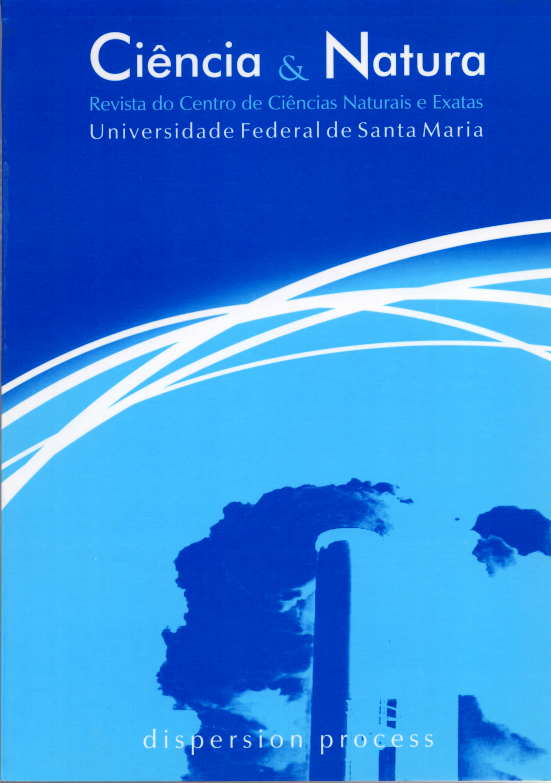Kalman Filtering in the Air Quality Monitoring
DOI:
https://doi.org/10.5902/2179460X63630Resumo
Data assimilation is a process where an improved prediction is obtained from a weighted combination between experimental measurements and mathematical model data. In the present work this procedure is applied to pollutant atmospheric dispersion by using a Kalman filter (KF). This is interesting approach, because the KF gives an output in which the balance between the data from the diffusion model and the experimental data is done automaticaly, through the Kalman gain. In addition, the Kalman filter computes the propagation of the error.Downloads
Referências
A.F. Bennett (1992): Inverse Methods in Physical Oceanography, Cambridge University Press. DOI: https://doi.org/10.1017/CBO9780511600807
H.F. de Campos Velho (1992): Non-modal Matrix in Initialization and Integration for a Barotropic Model and Numerical Study of Turbulent Vertical Dispersion, PhD Dissertation, Mechanical Engineering Graduation Program, Federal University of Rio Grande do Sul, Porto Alegre (RS), Brasil.
R.A. Daley (1991): Atmospheric Data Analysis, Cambridge University Press.
G.A. Degrazia, O.L.L. Moraes (1992): A Model for Eddy Diffusivity in a Stable Boundary Layer, Boundary Layer Meteorology, 58, 205-214. DOI: https://doi.org/10.1007/BF02033824
J.D. Hoffman (1993): Numerical Methods for Engineers and Scientists, McGraw-Hill Inc., New York, EUA
A.H. Jazwinski (1970): Stochastic Process and Filtering Theory, Academic Press, New York.
A.G. Nowosad, A. Rios Neto, H.F. de Campos Velho (2000a): Data Assimilation Using an Adaptive Kalman Filter and Laplace DOI: https://doi.org/10.1615/HybMethEng.v2.i3.50
Transform, Journal of Hybrid Methods in Engineering, 2 (3), 291-310.
A.G. Nowosad, A. Rios Neto, H.F. de Campos Velho (2000b): Data Assimilation in Chaotic Dynamics Using Neural Networks, Third International Conference on Nonlinear Dynamics, Chaos, Control and Their Applications in Engineering Sciences, Campos do Jordão (SP), Brasil, Vol. 6, Chapter 6 - Control, 212-221.
A.G. Nowosad, H.F. de Campos Velho, A. Rios Neto (2000c): Neural Network as a New Approach for Data Assimilation, Brazilian Congress on Meteorology, Rio de Janeiro (RJ), Brasil, Proceedings in CD-ROM (paper code PT00002), 3078-3086.
P. Zannetti (1990): Air Pollution Modeling, Computational Mechanics Publications, UK. DOI: https://doi.org/10.1007/978-1-4757-4465-1
X.F. Zhang, A.W. Heemink (1997): Data Assimilation in Transport Models, Applied Mathematical Modelling, 21, 2-14. DOI: https://doi.org/10.1016/S0307-904X(96)00107-2
Downloads
Publicado
Como Citar
Edição
Seção
Licença
Para acessar a DECLARAÇÃO DE ORIGINALIDADE E EXCLUSIVIDADE E CESSÃO DE DIREITOS AUTORAIS clique aqui.
Diretrizes Éticas para Publicação de Revistas
A revista Ciência e Natura está empenhada em garantir a ética na publicação e na qualidade dos artigos.
A conformidade com padrões de comportamento ético é, portanto, esperada de todas as partes envolvidas: Autores, Editores e Revisores.
Em particular,
Autores: Os Autores devem apresentar uma discussão objetiva sobre a importância do trabalho de pesquisa, bem como detalhes e referências suficientes para permitir que outros reproduzam as experiências. Declarações fraudulentas ou intencionalmente incorretas constituem comportamento antiético e são inaceitáveis. Artigos de Revisão também devem ser objetivos, abrangentes e relatos precisos do estado da arte. Os Autores devem assegurar que seu trabalho é uma obra totalmente original, e se o trabalho e / ou palavras de outros têm sido utilizadas, isso tem sido devidamente reconhecido. O plágio em todas as suas formas constitui um comportamento publicitário não ético e é inaceitável. Submeter o mesmo manuscrito a mais de um jornal simultaneamente constitui um comportamento publicitário não ético e é inaceitável. Os Autores não devem submeter artigos que descrevam essencialmente a mesma pesquisa a mais de uma revista. O Autor correspondente deve garantir que haja um consenso total de todos os Co-autores na aprovação da versão final do artigo e sua submissão para publicação.
Editores: Os Editores devem avaliar manuscritos exclusivamente com base no seu mérito acadêmico. Um Editor não deve usar informações não publicadas na própria pesquisa do Editor sem o consentimento expresso por escrito do Autor. Os Editores devem tomar medidas de resposta razoável quando tiverem sido apresentadas queixas éticas relativas a um manuscrito submetido ou publicado.
Revisores: Todos os manuscritos recebidos para revisão devem ser tratados como documentos confidenciais. As informações ou ideias privilegiadas obtidas através da análise por pares devem ser mantidas confidenciais e não utilizadas para vantagens pessoais. As revisões devem ser conduzidas objetivamente e as observações devem ser formuladas claramente com argumentos de apoio, de modo que os Autores possam usá-los para melhorar o artigo. Qualquer Revisor selecionado que se sinta desqualificado para rever a pesquisa relatada em um manuscrito ou sabe que sua rápida revisão será impossível deve notificar o Editor e desculpar-se do processo de revisão. Os Revisores não devem considerar manuscritos nos quais tenham conflitos de interesse resultantes de relacionamentos ou conexões competitivas, colaborativas ou outras conexões com qualquer dos autores, empresas ou instituições conectadas aos documentos.






